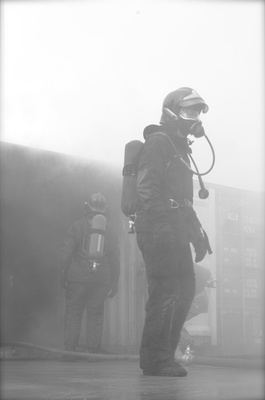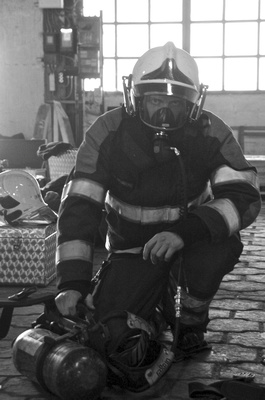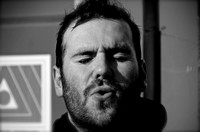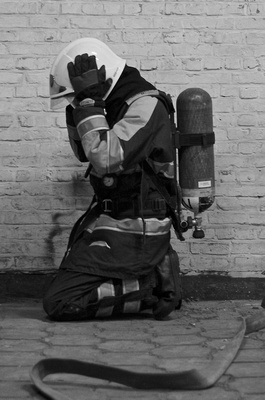Introduction.
As a firefighter and as an instructor I believe that every firefighter has a personal responsibility to stay healthy and in shape. This said I should also ad that healthy and 'in shape' are different for every person. It depends a bit on your natural physique. So it is hard to standardize this. To solve this everybody who starts in the fire departement has to meet certain demands on a physical level. And these are checked by physical tests when you start your career. But then... we have to maintain this physical readiness. Not many have written an better view on it then Timothy E. Sendelbach. He is a veteran within the fire services and has 28 years experience as student and as educator in fire and emergency services.
He has a clear view on physical fitness and I believe it can inspire any of us to first of all keep training to stay in shape. But also, to recognize that everybody has his limits. We are people and we do get older. It is worth to think about answering that last question too. What when I get older. Be honest with yourself, your colleagues and the community you are protecting. I also believe that it is every fire departments responsibility to develop a supportive human policy on this subject. It is something we are really struggling with in Belgium at the moment. And it does jeopardize our safety and is has an influence on the quality of the job done.
The Importance of Physical Fitness Standards in the Fire Service.
We owe it to ourselves and our crews to stay fit and get regular medical evaluations.
By author: Timothy E. Sendelbach.
Pubished monday, march 31, 2014. From the April 2014 issue of Firerescue.
URL: http://www.firefighternation.com/article/firefighter-fitness-and-health/importance-physical-fitness-standards-fire-service
It's a commitment that only a select few are willing to make. It brings with it the greatest of rewards, yet with each passing day come the destructive forces of time, bodily abuse and physiological stresses that compromise our longevity.
Being able to say "I'm a firefighter" is something we all cherish. Unlike the nine-to-fivers who fill the office buildings and cubicles throughout the cities we serve, being a firefighter is not a job; it's a way of life. For many, it becomes an inseparable passion, a force that unconsciously steers our daily lives. Our closets become a sea of blue; the walls of our houses become a storyboard of the fires we've fought, the certifications we've earned and the brothers and sisters with whom we've served. But with every cherished moment there's an unmistakable truth that's often overlooked: We're one day older and one day closer to passing the baton.
The career of a professional athlete is limited on the basis of their ability to physically perform to the standards their fans demand. For some, careers are shortened by an unexpected injury; others face the consequences of poor genetics or a less-than-disciplined youth. And yes, there are the chosen few who defy all odds and perform beyond their years, but they are few and far between.
In stark contrast to the world of professional sports, the fire service is not faced with a fan base that demands a roster of homerun hitters, three- point shooters or celebrity personalities. Nor are we afforded the opportunity to have an occasional bad day. Firefighters are expected to perform at their highest level, without exception and without excuses, on every call.
At the time of this writing, the American fire service has lost 27 of our brethren so far in 2014; 17 of these losses have been attributed to stress or overexertion, which eventually led to a heart attack or a cerebrovascular accident. As disturbing as it may be, a line-of-duty death (LODD) due to a cardiac-related event is not an uncommon occurrence in the fire service; in fact, it's been the elephant in the room for far too long.
For many, the solution to medical-related LODDs is healthy eating and physical fitness. But it's not that simple. Whether we like it or not, our profession is best suited for a youthful workforce that's absent of physical restrictions and/or limitations. In many cases we can prolong our careers by maintaining a healthy diet and working out regularly, but the fact remains, there are no guarantees. That's why we have an obligation to undergo regular medical screenings—and an equal obligation to step aside when evidence suggests that a health or age- related factor poses a risk to ourselves and therefore a risk to our crew.
Yet many within our proud profession continue to create barriers to the existing preventive measures that are most likely to promote our own longevity. They refuse to prioritize medical evaluations and mandatory physical fitness standards for fear of sending someone toward a medical disability or an early retirement—forgetting that retirement means nothing to someone who dies in the line of duty.
Equally disturbing are those who see their fitness and health as an individual choice that doesn't have repercussions on others. In a recent conversation, a firefighter told me, "If I died of a heart attack while fighting a fire, at least I'd die happy." If he'd been a bass fisherman on a small pond, in a boat by himself, that statement might not be so troubling —but as firefighters, we work as a team and when one of us goes down, it jeopardizes the safety of all of us.
As a firefighter who reluctantly admits that my years served now exceed the years I have remaining in my career, it's becoming increasingly clear that I have a responsibility to myself, my family and to those I serve, to maintain my health and fitness to the best of my ability. I have an equal responsibility to subject myself to medical evaluations that allow for the early diagnosis or the intervention of an illness that might threaten my ability to respond to fires—and to act on such information if/when I receive it.
Being a firefighter is ultimately about service. But that service isn't tied to your ability to throw a ladder or stretch a hoseline. There are countless ways to continue to serve your community through the department long after medical or age restrictions prevent you from going on calls. In fact, truly selfless service demands that you do everything you can to ensure you're fit for duty—and pass the baton when you're no longer fit to carry it.




